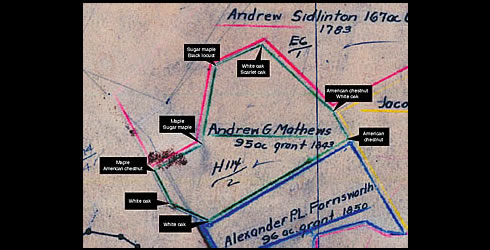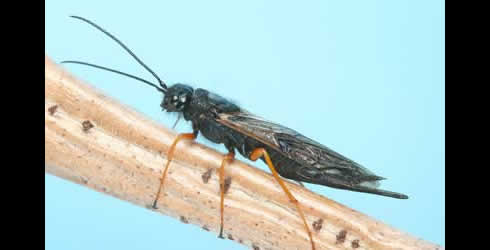
Old Deeds, Witness Trees Offer Glimpse of Pre-settlement Forest
Using old deeds and witness trees, a U.S. Forest Service scientist has created a glimpse of the composition of the forests that covered today's Monongahela National Forest before settlement and logging changed the landscape. Read more >>

Georgia's Forests Have a Bright Future
Georgia has the largest area of forest cover of any state in the south, with forests making up 67 percent of the land cover. This percentage has remained steady over the past 50 years while timber inventory has more than doubled. This finding, presented in a new Forest Inventory and Analysis report, suggests Georgia's forest landowners are engaged in long-term strategies to improve sustainability of their forests. Read more >>

New Guide to Woodwasps of the Western Hemisphere
When this woodwasp was found in New York State in 2004, it had already caused major damage to pine plantations globally. This guide includes DNA barcodes to identify larval and adult woodwasps. Read more >>

US Forest Service Assists with Fire Monitoring in Zambia
The Forest Service International Programs invited Tonja Opperman, a US Forest Service fire applications specialist, to teach fire monitoring in Zambia's Kafue National Park Read more >>
Fires and Invasive Grass Threaten American West - Mike Pellant, BLM's lead for the Great Basin Restoration Initiative, spoke on NPR's 'Talk of the Nation Science Friday', covering on cheatgrass, range fires, sagebrush, climate change and the black fingers of death.
Science delivery position available in Washington DC - A postgraduate fellowship is available in science delivery and web development via the Oak Ridge Institute for Science and Education. The position works with the research and development arm of the US Forest Service. Learn more about this exciting opportunity.
Tough timber on a tiny scale - What would you choose as your bullet proof barrier? Wood? Nanocellulose is wood that's been carefully smashed to pieces then reformed into neatly-woven "nano-scale" fibers. This new wonder-material is very stiff, lightweight, and it has eight times the tensile strength of steel.
Welcome
The Research and Development (R&D) arm of the US Forest Service works at the forefront of science to improve the health and use of our Nation’s forests and grasslands.
Over 500 Forest Service R&D scientists work in a range of biological, physical, and social science fields to promote sustainable management across all 50 states and US territories. The work has a steady focus on informing policy and land‐management decisions and involves a range of partners including other agencies, academia, nonprofit groups, and industry.
Forest Service R&D science is divided into seven Research Topics and five Priority Areas to promote an integrated approach to addressing broad, complex environmental and social issues. R&D research is conducted at over 67 field sites and 80 Experimental Forests & Ranges and is divided among the research stations.
Research Topics



 Old Deeds, Witness Trees Offer Glimpse of Pre-settlement Forest
Old Deeds, Witness Trees Offer Glimpse of Pre-settlement Forest Georgia's Forests Have a Bright Future
Georgia's Forests Have a Bright Future New Guide to Woodwasps of the Western Hemisphere
New Guide to Woodwasps of the Western Hemisphere US Forest Service Assists with Fire Monitoring in Zambia
US Forest Service Assists with Fire Monitoring in Zambia





